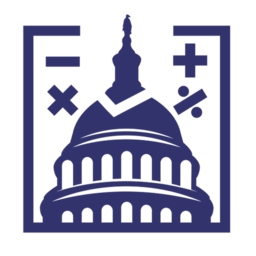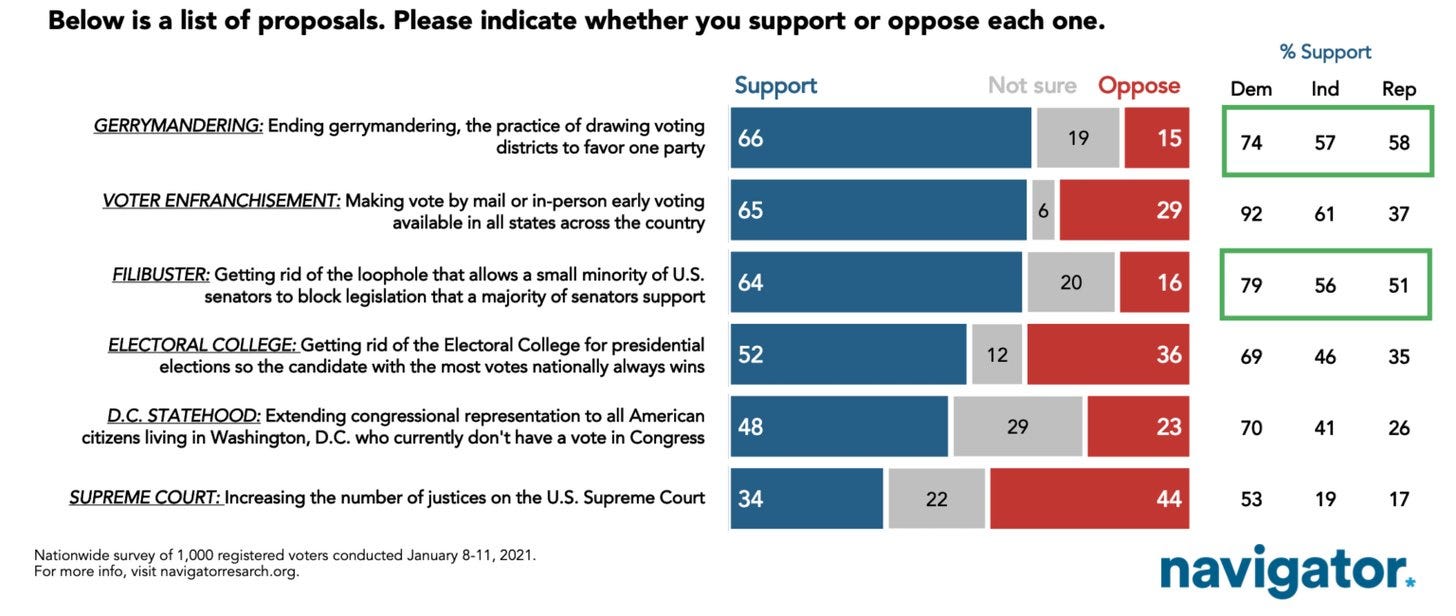How strong is Biden's mandate for change?
Polls reveal that the newly-inaugurated president has quite a lot of leverage
The fireworks celebrating Joe Biden’s inauguration as president lit up the view of the night sky from my balcony a little before 10:00 PM last night. Though I live a few miles away from the National Mall, the energy emanating from Washington was nevertheless palpable. For many, yesterday was an end to mourning in America.
The demand for a progressive agenda on Capitol Hill had begun about five and a half hours before the fireworks. That’s when Vice President Kamala Harris swore in three new Democrats to the Senate (one as a replacement for her vacating her California seat) and officially gave the party control of the barest of majorities in the chamber. As of about 4:40 PM yesterday, Democrats controlled both chambers of Congress and the presidency.
But what will lawmakers do with this power? How will they perceive a public mandate for change, if they perceive one at all? Let's take a look at some early polling data on the fledgling Biden administration.
Editor’s Note: This is a paid post for premium subscribers. If you are a subscriber and have friends or family that you think might learn something from this post, you should feel open to forward it to them regardless of their membership status. But if you have been graciously sent this post by a friend that subscribes, please consider signing up for updates yourself by hitting the button below!
A report from Gallup on five of Biden's policy proposals — raising corporate taxes, strengthening labor unions, imposing new regulations on industries (perhaps climate regulations?), adding a public insurance option to Obamacare, and increasing infrastructure spending — are almost all broadly popular.
On taxation, Frank Newport writes:
Given that less than 20% of Americans have confidence in big business, and a similarly small number give business executives a high honesty and ethics rating, there is going to be little love lost if corporations have to pay more in taxes. Plus, and most importantly, almost seven in 10 Americans say that corporations currently pay too little in taxes.
On labor unions, he writes that Gallup finds that 65% of Americans approve of them, the warmest sentiment since 1999; that 76% have a great deal, quite a lot or some confidence in unions; and that a plurality wants them to have more influence than they currently do.
On health care, Newport writes that:
Recent polling by Gallup shows that over half of Americans continue to approve of the Affordable Care Act. Kaiser Family Foundation research finds that 69% of Americans favor "a government-administered health plan that would compete with private health insurance plans and be available to all Americans" -- a higher percentage than favor a "Medicare for All" plan (53%).
It's worth noting that tracking data from Civiqs, an online pollster, also finds that 48% of adults want the ACA to be expanded, versus 36% who want it to be repealed. I consider this evidence pretty compelling for expansionist policies.
Infrastructure is, frankly, a gimme. Almost everyone — voters and politicians — agrees that more spending would be good. Polling also reveals particularly strong support if the super-rich are the ones footing the bill.
That leaves Biden's proposals on regulation, which are, abstractly, the room for most interpretation by White house analysts. Newport writes that "Over seven in 10 Americans believe there is either too much or the right amount of regulation," and that 56% of Americans believe the government has too much power.
That would seem to bode poorly for the Administration, however, much relies on the specifics of the proposals. Regulating (and even "breaking up") Big Tech is rather popular, for example, and old polling about the Keystone XL oil pipeline showed more Americans in opposition than support of it. Rejoining the Paris Climate accord and other environmental regulations also tend to poll well. So regulatory reform will largely rely on policy specifics and marketing.
...
One final question is whether people support Democrats getting rid of the filibuster, which they might need to do in order to pass some of these policies. Here's the most recent poll I could find:
While the question wording is pretty obviously biased, I doubt the effect is that large. You can reasonably make the argument that with the right press coverage, Democrats could pretty easily get away with abolishing it. That would make it easier to pass their agenda — though, if we're going off what the public wants, those policies "should" be passed anyway.
…
It's clear from these data that the public is on board with a lot of the government-expanding policy proposals of Joe Biden's new administration. The question, as ever in Washington, will be whether partisans can agree on the steps to take in time to actually get anything done.




